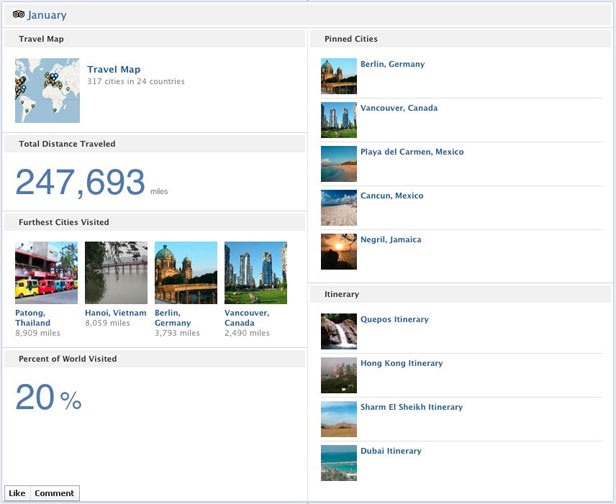New Apps Let Facebook Record Your Personal History

Facebook won the loyalty of more than 800 million users largely by getting them into the habit of visiting again and again to see the latest updates, comments, and photos posted by friends. Now the site will also let outside apps provide even more content, and it will encourage people to spend time looking back over activity from months or even years ago. New features introduced at an event in San Francisco last night will enable users to automatically record their eating, reading, exercise, and other habits over time, share them with friends, and review their previous actions.
The key to the new features is an update to the Timeline page that Facebook founder Mark Zuckerberg introduced at his company’s F8 event last September. Now, with a user’s permission, third-party websites and mobile apps can record details of what the person is doing and automatically feed that information to the person’s Timeline page through a “Timeline app” that sends the data to Facebook and provides the necessary permission and privacy settings.
“Your timeline is not just a way to tell your story based on what you’re doing on Facebook, but using your activity out in the rest of the world as well,” said Carl Sjogreen, director of platform products at Facebook, at the launch event.
Enthusiasts and researchers have experimented with comprehensively logging their lives for years. In 1998, for example, Microsoft researcher Gordon Bell began trying to digitally capture as much as he could about everything he did. But Bell and others have often found that browsing and reviewing their records presented a greater challenge than capturing them. Facebook’s new design could help people do both.
Facebook’s hope is not just to hook in users with more experiences, but also to make use of the new trove of data that Timeline apps will provide. The information could help the company’s efforts to target ads more cleverly, although Facebook says that for now, data from Timeline apps is not used in that way.
Sjogreen announced that 60 companies have had Timeline apps approved already, allowing Facebook to track all sorts of new things: when, where, and for how long a person using the RunKeeper mobile app went running, for example, or how long a person has spent reading a book on a Kobo e-reader. Until now, only a handful of Timeline apps were available, such as a music app from Spotify and news apps from Yahoo and the Washington Post. Many more apps will be created in the coming months, said Sjogreen.
Getting a much broader view of users’ lives allows Facebook to offer a way for them to explore long-term trends, said Sjogreen: “We try to summarize all the activity [from an app] in a given month or year. It might show the places I’ve been, restaurants I’ve eaten at, whatever is most interesting or relevant.”
Information that piles up fast, such as the songs a person has listened to, can be used to identify trends such as which songs defined a summer vacation, said Sjogreen. This feature is in place today. Summarizing the total distance a runner has covered, or which routes he or she ran most often, could help shape future workouts. “Summarization reveals patterns that can be really interesting,” said Sjogreen. “We’ve just started with that, but there’s a lot more we can do when we have more information.”
The result will be a much truer representation of Facebook users’ lives than the current profile page that lists a person’s basic information, said Sjogreen. “You are more than where you went to college and who you married and your last five status updates, which is what the profile had been before.”
Austin Haugen, a product manager for Facebook Platform, told Technology Review that Facebook was working on tools that could upload past activity from other apps and services to fill out a person’s Timeline. He predicted that Facebook users and their friends would use the new Timeline to reminisce in extreme detail or to peek at the history of other users’ lives. “I recently got engaged, and in 10 years we’ll look back and say, ‘Remember when we were planning our wedding?’” he said. “If we have a kid, they can use Timeline to see what was important to us back then.”
Ben Silbermann, cofounder of Pinterest, a site where people create and share “virtual pinboards” of photos, products, and other content found across the Web, thinks this kind of tool is overdue. “Everyone’s nostalgic—it’s just that the Internet itself is really young,” he says. “It takes a company like Facebook to start changing that.”
Pinterest’s Timeline app can show which of a person’s online pinboards has been most active. Many people use them to organize ideas and inspiration for upcoming plans, such as a wedding or vacation, says Silbermann. Now Facebook will make it possible to look back at a significant event and see the brainstorming leading up to it.
Keep Reading
Most Popular
Large language models can do jaw-dropping things. But nobody knows exactly why.
And that's a problem. Figuring it out is one of the biggest scientific puzzles of our time and a crucial step towards controlling more powerful future models.
The problem with plug-in hybrids? Their drivers.
Plug-in hybrids are often sold as a transition to EVs, but new data from Europe shows we’re still underestimating the emissions they produce.
How scientists traced a mysterious covid case back to six toilets
When wastewater surveillance turns into a hunt for a single infected individual, the ethics get tricky.
Google DeepMind’s new generative model makes Super Mario–like games from scratch
Genie learns how to control games by watching hours and hours of video. It could help train next-gen robots too.
Stay connected
Get the latest updates from
MIT Technology Review
Discover special offers, top stories, upcoming events, and more.